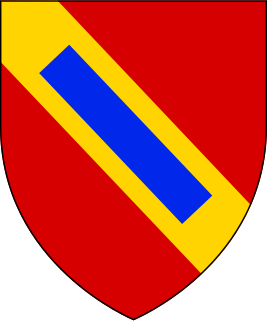Wortley baronets, of Wortley (1611)

- Sir Francis Wortley, 1st Baronet (c. 1592–1652)
- Sir Francis Wortley, 2nd Baronet (died 1665)
The Wortley Baronetcy, of Wortley in the County of York, was a title in the Baronetage of England. It was created on 29 June 1611 for Francis Wortley, who later sat as member of parliament for East Retford and supported the Royalist cause in the Civil War. The title became extinct on the death of the second Baronet in 1665. [1]
The family seat was at Wortley Hall, near Barnsley, Yorkshire.

There have been five Dunbar Baronetcies; the first four in the Baronetage of Nova Scotia, and the last in the Baronetage of the United Kingdom. There is also a Hope-Dunbar Baronetcy of Baldoon.

There have been five baronetcies created for persons with the surname Barker, three in the Baronetage of England, one in the Baronetage of Great Britain and one in the Baronetage of the United Kingdom. All five creations are extinct.
There have been 18 baronetcies created for persons with the surname Campbell, six in the Baronetage of Nova Scotia and twelve in the Baronetage of the United Kingdom.
There have been three baronetcies created for members of the Anstruther family, two in the Baronetage of Nova Scotia and one in the Baronetage of Great Britain. Two of the creations are extant while one is extinct.

The Eliott Baronetcy, of Stobs in the County of Roxburgh, is a title in the Baronetage of Nova Scotia. It was created on 3 December 1666 for Gilbert Eliott. The second baronet was a member of the pre-union Parliament of Scotland. The third Baronet sat as Member of Parliament for Roxburghshire. The Eliott Baronets share a common early Elliot ancestry with the nearby Earls of Minto (Elliot). It is thought that the surname spelling differences were contrived to differentiate the branches.
There have been several baronetcies created for people with the surname Dalrymple.
There have been four baronetcies created for persons with the surname Andrews, two in the Baronetage of England, one in the Baronetage of Great Britain and one in the Baronetage of the United Kingdom. All four creations are extinct.

There have been three baronetcies created for persons with the surname Burdett, two in the Baronetage of England and one in the Baronetage of Ireland. As of 2008, two of the creations are extant while one is dormant.
There have been six baronetcies created for persons with the surname of Lawson, two in the Baronetage of England and four in the Baronetage of the United Kingdom. Two creations are extant as of 2010.
There have been two baronetcies created for people with the surname Cholmeley, one in the Baronetage of England and one in the Baronetage of the United Kingdom. One creation is extant as of 2008. The family surname is pronounced "Chumley".
There have been four baronetcies created for people with the surname Lee, all extinct.
There have been seven baronetcies created for persons with the surname Powell, five in the Baronetage of England and two in the Baronetage of the United Kingdom. Only one creation is extant as of 2007.
Six baronetcies have been held by the Grant family.

There have been three Baronetcies created for persons with the surname Seymour, two in the Baronetage of England and one in the Baronetage of the United Kingdom. One creation is extant as of 2008.
There have been five baronetcies created for members of Clan Ramsay, four in the Baronetage of Nova Scotia and one in the Baronetage of the United Kingdom. The baronetcy in the Baronetage of the United Kingdom is extant as of 2022.

Sir Francis Wortley, 1st Baronet (1591–1652), poet and politician who sat in the House of Commons between 1624 and 1626. He supported the Royalist cause in the English Civil War.
Francis Wortley may refer to:
The Rivers, later Rivers-Gay, later Rivers Baronetcy, of Chafford in the County of Kent, was a title in the Baronetage of England. It was created on 19 July 1621 for John Rivers. He was a grandson of Sir John Rivers, Lord Mayor of London between 1573 and 1574. The sixth Baronet assumed the additional surname of Gay in circa 1760. This surname was also used by the seventh Baronet but not by any subsequent Baronets. The title became extinct on the death of the eleventh Baronet in 1870.
The Englefield Baronetcy, of Wootton Basset in the County of Wiltshire, was a title in the Baronetage of England. It was created on 25 November 1611 for Francis Englefield. He was a great-grandson of Sir Thomas Englefield, Speaker of the House of Commons, and the nephew of Sir Francis Englefield. The seventh Baronet was an antiquary and scientist. The title became extinct on his death in 1822.
The Wolstenholme Baronetcy, of London, was a title in the Baronetage of England. It was created on 10 January 1665 for John Wolstenholme, who had previously represented West Looe, Newport and Queenborough in Parliament. He had been heavily fined by the Parliamentarians for supporting the Royal cause during the Civil War. The third Baronet sat as Member of Parliament for Middlesex. The title became extinct on the death of the seventh Baronet in 1762.